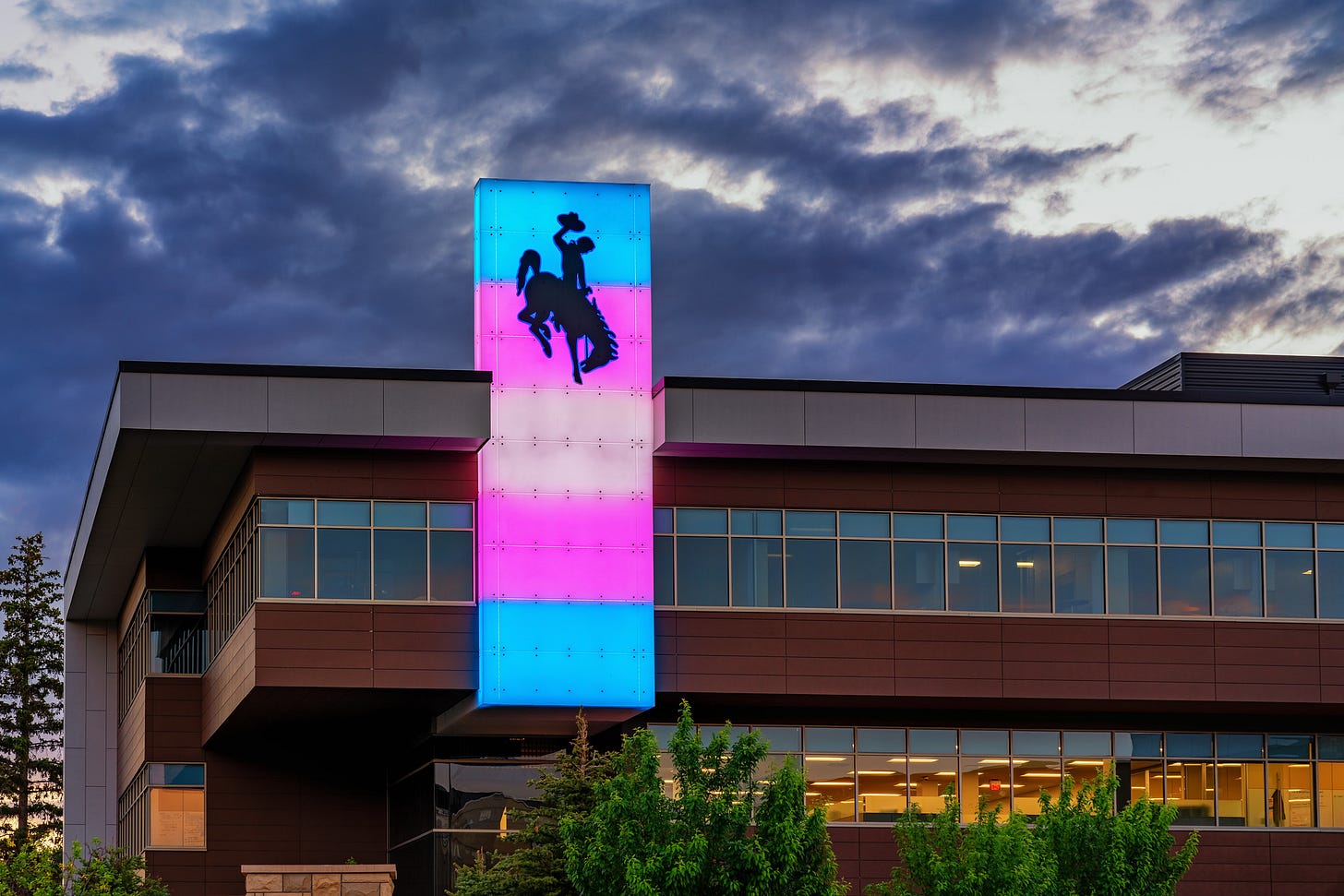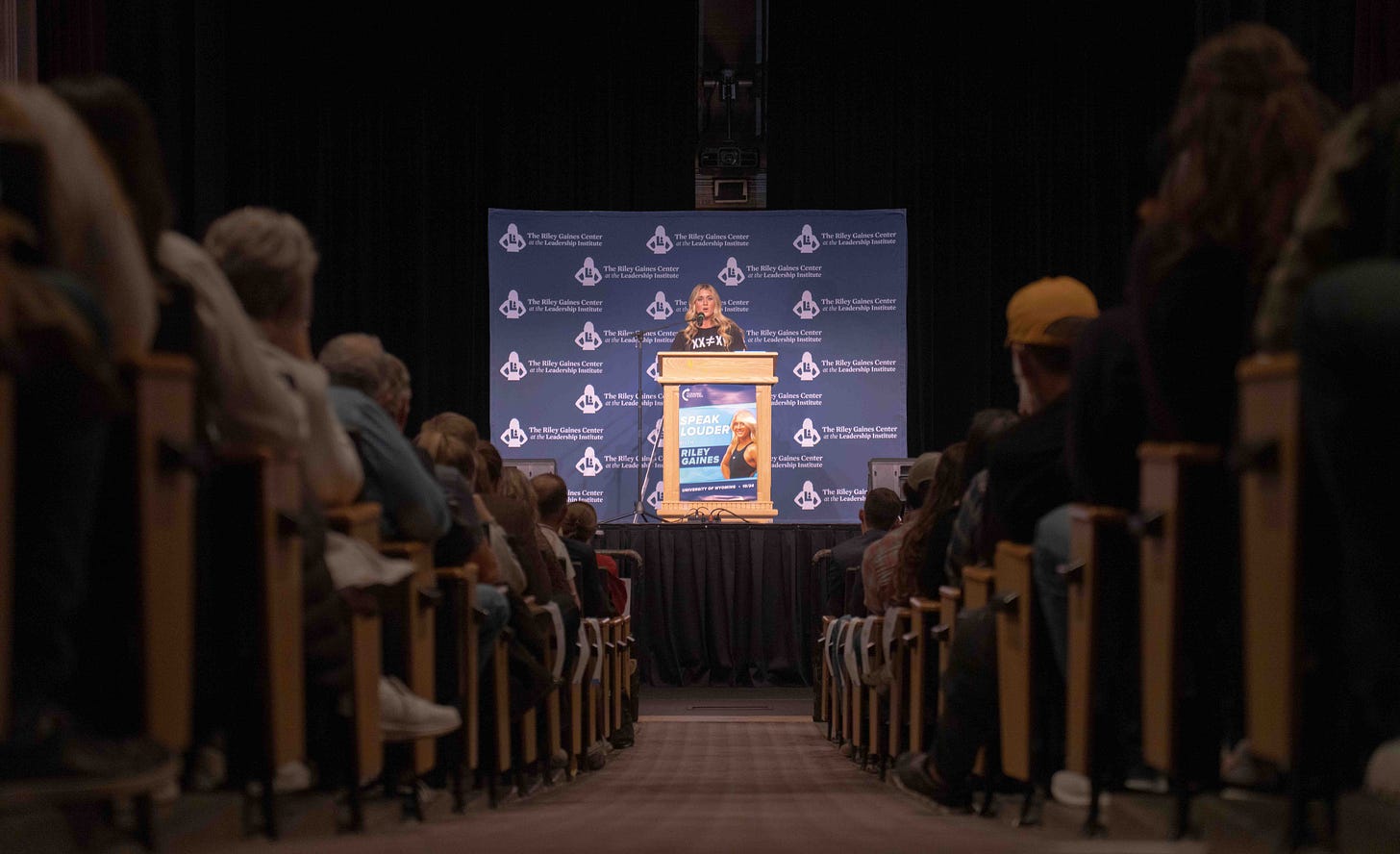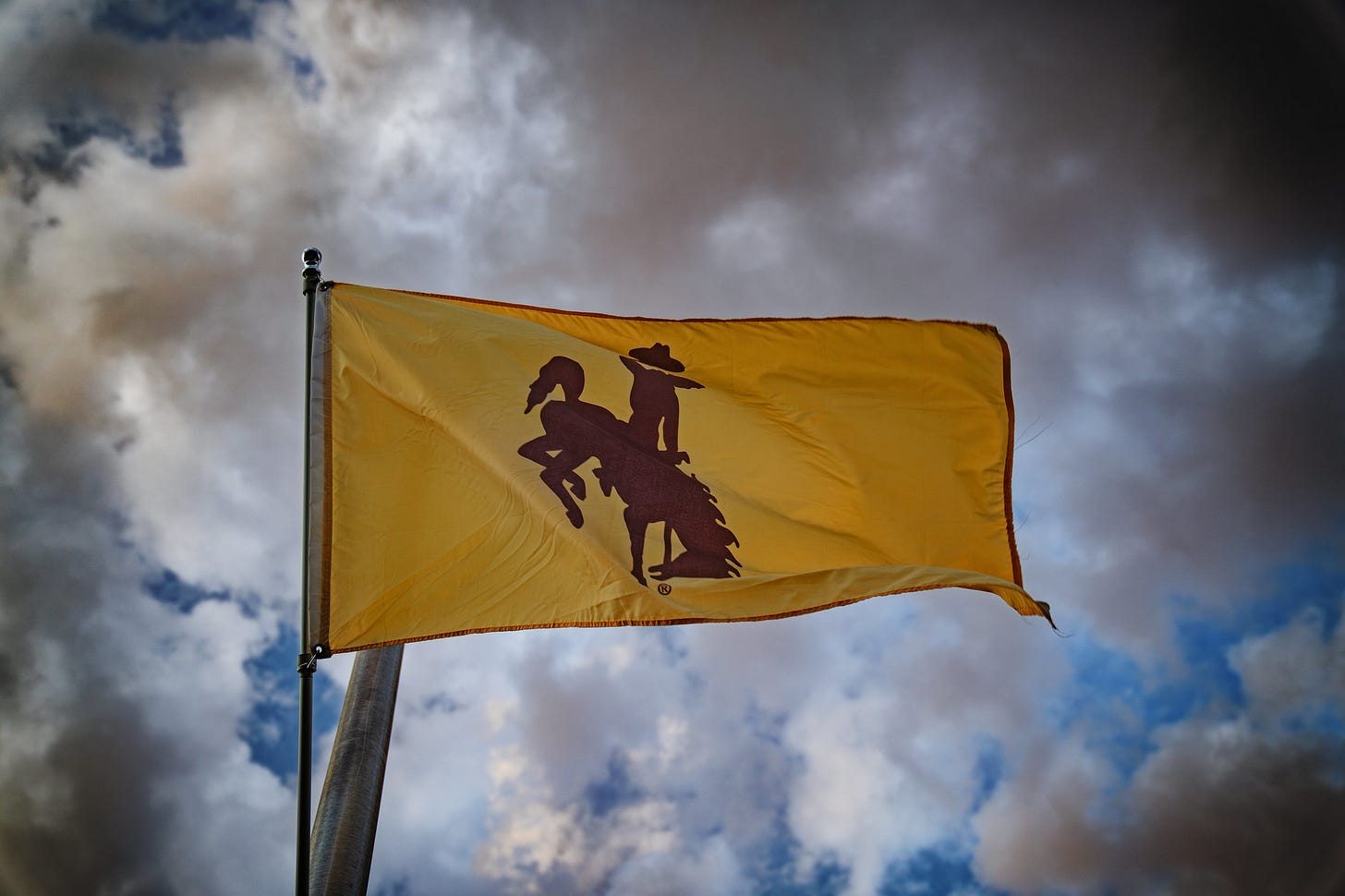Senate Education Committee advances transgender sports ban
The bill extends the state’s current ban to cover intercollegiate sports at the University of Wyoming and community colleges. Laramie Sen. Chris Rothfuss voted against the bill.

Transgender participation in sport is back on the Wyoming Legislature’s agenda, with at least two bills this session aiming to widen the ban passed in 2023.
The Senate Education Committee advanced one of these bills Friday, voting 4-1 to recommend the passage of Senate File 44. The proposed legislation would forbid transgender athletes from competing at intercollegiate events involving the University of Wyoming or any of the state’s community colleges.
Laramie Sen. Chris Rothfuss (SD-9) — who remains on the education committee despite an earlier announcement indicating his removal — cast the sole dissenting vote, arguing it wasn’t the role of government to mandate parameters for athletic competition.
“An outright ban does end up being discriminatory in circumstances where it would be appropriate for transgender individuals to be competing and doing so fairly and safely,” Rothfuss said. “We definitely have something that needs to be addressed. I agree with you on that: it needs to be addressed. But this takes it out of the hands of the folks that have the time to address it — and that is the NCAA and the NJCAA. And those communities specifically that know their athletics the best can work this through.”
SF44 is sponsored by Evanston Sen. Wendy Schuler (SD-15), who also serves as the education committee’s senate chair.
“It just protects those female, biological female, athletes — not only with the safety issues, but just the fairness issues,” Schuler said. “We just need to make sure that our biological female athletes have every opportunity to compete on a level playing field where they’re safe, where it’s fair, and we just need to safeguard the integrity of women’s sports.”
UW at the heart of the discourse
Transgender participation in women’s sports has been a hot topic in Wyoming in recent years.
In 2023, the state passed a bill (also sponsored by Schuler) banning transgender women and girls from competing on high school sports teams. Later that year, Riley Gaines — a former collegiate swimmer who once tied for fifth with a trans swimmer — gave a speech at the University of Wyoming. She railed against trans inclusion in sports and society, occasionally mocking the appearance of individual trans people and repeatedly calling for a return to “Christian” values — while explicitly endorsing anti-trans legislation planned for Wyoming.
In October and November, the UW Women’s Volleyball team forfeited two games against San José State, refusing to play that team’s transgender athlete.
Macey Boggs, a setter for the UW Cowgirls, testified to the education committee via Zoom. She praised the bill and urged lawmakers to pass it. She also referenced her participation in an ongoing lawsuit against the NCAA Mountain West Conference.
“Women and girls of all ages need and deserve access to fair competition without the threat or concern of male athletes taking their spots,” Boggs said. “I was stripped of the chance to play my final collegiate matches because we faced a situation no woman should ever have to face: either compete against a team rostering a male athlete on a woman’s scholarship, robbing us of a fair and safe competition — or forfeit the rest of our season.”
Boggs said her beliefs were “rooted in evidence-based facts” rather than “feelings or identities” while asserting that “natal males have inherent physical advantages in women’s sports, regardless of how they identify or what treatments they undergo.”
The research investigating whether trans women retain a biological advantage post-transition is not so conclusive. It’s an active area of research with evidence pointing in many directions. It might be that advantages persist in some metrics while not in others, and that these realities impact certain sports more than others, while impacting some sports not at all. It may be that advantages fade over time.
But Boggs wasn’t the only commenter making appeals to an unsettled science.
Dishonest data
Erin Friday, president of a nonprofit called Our Duty, said her organization protected women and girls from the “gender industry.”
She said she supported the bill and made reference to Riley Gaines and others who have allegedly been disadvantaged by trans athletes. Friday repeated the false claim that Algerian boxer Imane Khelif, who competed in the Olympics last summer, is trans — and cited a source becoming popular in anti-trans advocacy.
“According to a recent UN report, over 600 female athletes in more than 400 competitions have lost more than 890 medals in 29 different sports as of March of 2024 to trans-identified males,” Friday alleged.
This allegation references a report that did not study this issue. Rather, the report includes among its citations a submission from the anti-trans organization Women’s Liberation Front.
As detailed by the left-leaning podcast “Where There’s Woke,” the list of disadvantaged female athletes didn’t just look at “medals” — a word evoking Olympic or other prestigious heights — but also broadly “records, scholarships or other opportunities.” The list includes poker and Irish dance among other competitions not typically cited by those concerned about biological advantages.
Perhaps most significantly, individual competitions are listed multiple times. For example, a 2023 qualifying event in Disc Golf is listed thrice, noting a lost award for the ciswomen who could have earned first, second and third place had they not been bested by a trans athlete securing the win and pushing each down a peg.
This means the list counts a single win by one trans athlete in a qualifying event as three lost “medals.”

During her speech at UW in 2023, Gaines did not cite this specific report nor the list it references, but she did share misinformation of her own. Chief among Gaines’ falsehoods was her misrepresentation of the debate surrounding transgender participation in sports.
Since long before the topic became a battlefield in the culture war, those interested in both human rights and fair competition have been debating, studying and setting down rules about transgender participation in sports. These conferences generally land on rules seeking to balance the value of inclusivity, the widespread interest in fair competition and the most up-to-date research in an area of evolving study.
Anti-trans activists have presented the debate as being between those who want an outright total ban — like Friday, Boggs and Gaines herself — and those who want total inclusion no matter the circumstances or individual details.
But as other testimony at the committee hearing demonstrated, that’s not where the debate lies, not at the highest levels and not in Wyoming.
Wyoming Equality: ‘There’s extremism on both sides’
Specifically, Sara Burlingame pushed back on this common outsider’s characterization of the debate.
Burlingame is the executive director of Wyoming Equality, the state’s preeminent LGBTQ+ advocacy organization. While she opposed the bill, she invited conservation about the topic.
“I think that there’s extremism on both sides of this, and a lot of people in my position don’t acknowledge that there is extremism on the left,” she said. “But Wyoming Equality has always been very vocal in naming what we see as some short-sightedness.”
Burlingame first took aim at her own camp.
“On the left, sometimes we hear that any athlete — irrespective of physical superiority that can only be accounted for by the sex they were assigned at birth — shouldn’t have to do anything at all,” she said. “And this is not a mainstream view, but it’s an extremist one. Some folks might insist that any accounting for hormone levels, or a metric that asks trans athletes to align with hormone levels consistent with cisgender girls, is unacceptable.”
But Burlingame said that’s “an extreme position” which “doesn’t reflect reality” and “creates an unfair playing field.”
But the left is not in power — not in the country and especially not in Wyoming where Democrats constitute an extreme minority in both chambers of the Wyoming Legislature and where even moderate Republicans are outnumbered in the House by that chamber’s right-wing majority.
“On the right, we have bills like this, and bills like this relegate all transgender athletes to the bench — and that’s not where they belong,” Burlingame said. “Bills like this insist that it is immaterial that a transgender girl has satisfied the requirements, that she’s taken the intensive steps to ensure that her hormones and her strength will fall within the same range as her sister counterparts. Instead, we fan the flames of misinformation, and we’ve seen a lot in Wyoming.”
Burlingame said SF44 mandates total exclusion where there should be conversation balancing inclusion and fairness.
She was not the only commenter to testify against the bill, however, and Nyoka Erickson had a different view.
Having played flat track roller derby in Laramie for nearly a decade — in addition to stints on various hockey teams, including UW Women’s Ice Hockey — Erickson said she, as an athlete, did not feel threatened or disadvantaged by the inclusion of trans athletes.
“I’ve played many games against trans women who were openly trans, likely games against women I didn’t know were trans,” Erickson said. “I don’t think it’s appropriate for the state to tell organizations … what their policy should be on this issue. I additionally, because of my experiences, believe that trans women do belong to women’s sports.”
Though derby is full-contact, Erickson said the Women’s Flat Track Derby Association — the sport’s international governing body — lets transgender athletes play “with no restrictions.”
The association’s statement on the subject declares identifying as transgender “is not in any way related to an individual’s eligibility for participating.”
“An individual who identifies as a trans woman, intersex woman, and/or gender expansive may skate with a WFTDA charter team if women’s flat track roller derby is the version and composition of roller derby with which they most closely identify,” the statement reads.
The association makes a further commitment to promoting inclusion across the sport.
“The WFTDA will actively work to promote a climate that is welcoming and inclusive of transgender, intersex, and gender expansive participants,” the statement reads. “Any conduct which fosters a hostile environment for any participant on the basis of gender identity will not be tolerated.”
Roller derby exists outside of collegiate athletics and would not be affected by the passage of SF44.
Supporters both foreign and domestic (to Wyoming)
The bill is supported by many in Wyoming, including Wyoming Superintendent of Public Instruction Megan Degenfelder, the Wyoming Community College Commission and Moms for Liberty — all of whom sent representatives to testify during the hearing Friday.
But the bill has also garnered attention, and support, from those outside Wyoming’s borders, such as the SPLC-designated hate group known as Gays Against Groomers. The committee heard from two testifiers representing this group — one who commented via Zoom, and another who commented in person.
Ultimately, the committee sided with these voices. Casper Sen. Charles Scott (SD-30) voiced his support just before the vote.
“I think this bill is just basic common sense,” he said. “I don’t see anything difficult to work through. I think we could use a little common sense. We’re the ones that make the laws, and in this one, common sense is being abused and the law is needed.”
The committee proposed and passed one amendment, inserting a single word to clarify the bill applies only to “intercollegiate” athletic competitions and not to intramural sports or activities.
Another transgender sports ban has been filed in the Wyoming House. The house bill also extends the current ban to collegiate sports, but goes further, specifically including intramural sports, and giving students, parents and schools the explicit power to sue athletic associations.
The sports bans are just two of several anti-trans proposals being tried this session. Other bills seek to limit the legal recognition of trans people or restrict their bathroom usage.
Correction: An earlier version of this story’s headline made reference to the “House Education Committee.”







It would be nice if the Wyoming legislature would defer to a sport's organizing body rather than injecting themselves into every aspect of life they can get their grubby mitts on. Are the organizing bodies of sports perfect? Absolutely not. But they at least care about sport outside of BS culture war stunts. I wish I could get over to Cheyenne to speak against the bill.
There are not "extremists on both sides" of trans rights and trans lives. That's some sickening, regressive, centrist bullshit. It's incredibly disempowering and counterproductive.
There is nothing extreme, unreasonable, oppressive, or hurtful about the "left" position on this issue. When you "both sides" this issue, you hurt people--plain and simple.